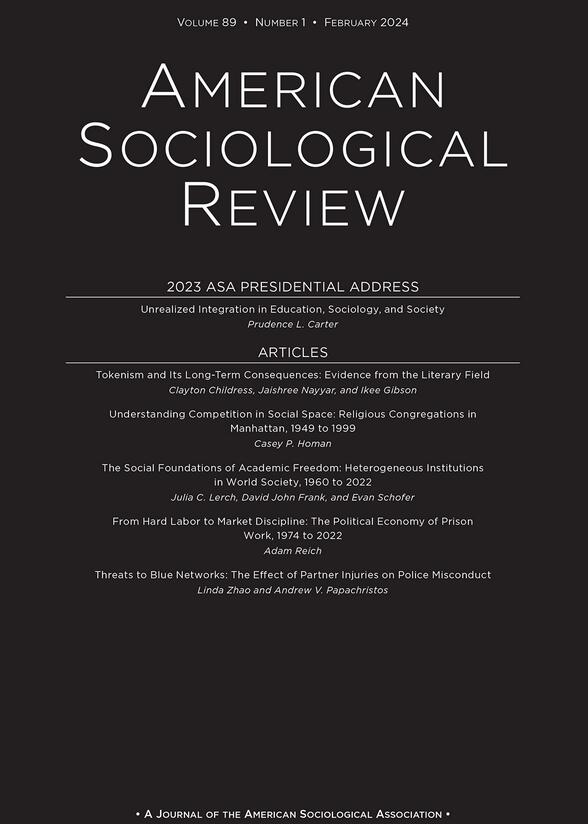“There Is an Eye on Us”: International Imitation, Popular Representation, and the Regulation of Homosexuality in Senegal
IF 6.2
1区 社会学
Q1 SOCIOLOGY
引用次数: 8
Abstract
Drawing on data from Senegal, this article develops the concept of pockets of world society to explain how adherence to a liberal vision of gay rights emerges within an otherwise illiberal legal landscape. Pockets of world society appear at the site where the global field of human rights penetrates the national juridical field. Senegal’s Ministry of Justice sits at this juncture. It is a member of both fields but tends toward a logic of international imitation. The ministry accommodates world society’s stance on homosexuality, offering a moderate re-interpretation of its nation’s criminalization, and quietly circumventing local law to enact global scripts of sexual actorhood. In stark contrast, Senegalese courts, located solely within the national juridical field, adhere to a logic of popular representation, rejecting sexual self-determination, insisting on national sovereignty, and carrying out the nation’s criminalization of homosexuality in accordance with both law and collective will. These conflicting logics are driven by external pressures, field membership and position, professional trajectories, and sources of legal legitimacy and social accountability. Finally, I contend that the conflict in Senegal spotlights not only world society’s limits, but its persistent strength and its ability to disrupt the coherence of the law.“有一只眼睛在盯着我们”:国际模仿、民众代表和塞内加尔对同性恋的监管
根据塞内加尔的数据,本文发展了世界社会口袋的概念,以解释如何在不自由的法律环境中坚持同性恋权利的自由愿景。在全球人权领域渗透到国家司法领域的地方,出现了世界社会的口袋。塞内加尔司法部正处在这个关键时刻。它是这两个领域的成员,但倾向于国际模仿的逻辑。该部顺应了世界社会对同性恋的立场,对本国的刑事定罪进行了温和的重新解释,并悄悄地绕过当地法律,制定了全球性行为准则。与此形成鲜明对比的是,塞内加尔的法院完全处于国家司法领域,坚持大众代表的逻辑,拒绝性别自决,坚持国家主权,并根据法律和集体意志将同性恋定为刑事犯罪。这些相互冲突的逻辑是由外部压力、领域成员和地位、职业轨迹以及法律合法性和社会责任的来源所驱动的。最后,我认为,塞内加尔的冲突不仅突出了世界社会的局限性,而且突出了世界社会的持久力量及其破坏法律一致性的能力。
本文章由计算机程序翻译,如有差异,请以英文原文为准。
求助全文
约1分钟内获得全文
求助全文
来源期刊

American Sociological Review
SOCIOLOGY-
CiteScore
13.30
自引率
3.30%
发文量
35
期刊介绍:
The American Sociological Association (ASA) is a non-profit membership association established in 1905. Its mission is to advance sociology as a scientific discipline and profession that serves the public good. ASA is comprised of approximately 12,000 members including faculty members, researchers, practitioners, and students in the field of sociology. Roughly 20% of the members work in government, business, or non-profit organizations.
One of ASA's primary endeavors is the publication and dissemination of important sociological research. To this end, they founded the American Sociological Review (ASR) in 1936. ASR is the flagship journal of the association and publishes original works that are of general interest and contribute to the advancement of sociology. The journal seeks to publish new theoretical developments, research results that enhance our understanding of fundamental social processes, and significant methodological innovations. ASR welcomes submissions from all areas of sociology, placing an emphasis on exceptional quality.
Aside from ASR, ASA also publishes 14 professional journals and magazines. Additionally, they organize an annual meeting that attracts over 6,000 participants. ASA's membership consists of scholars, professionals, and students dedicated to the study and application of sociology in various domains of society.
 求助内容:
求助内容: 应助结果提醒方式:
应助结果提醒方式:


